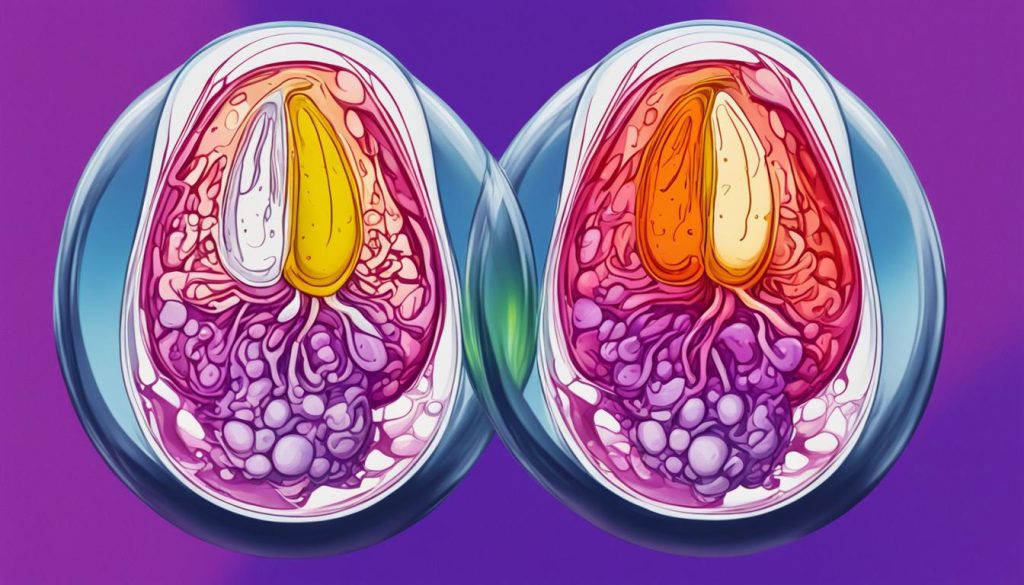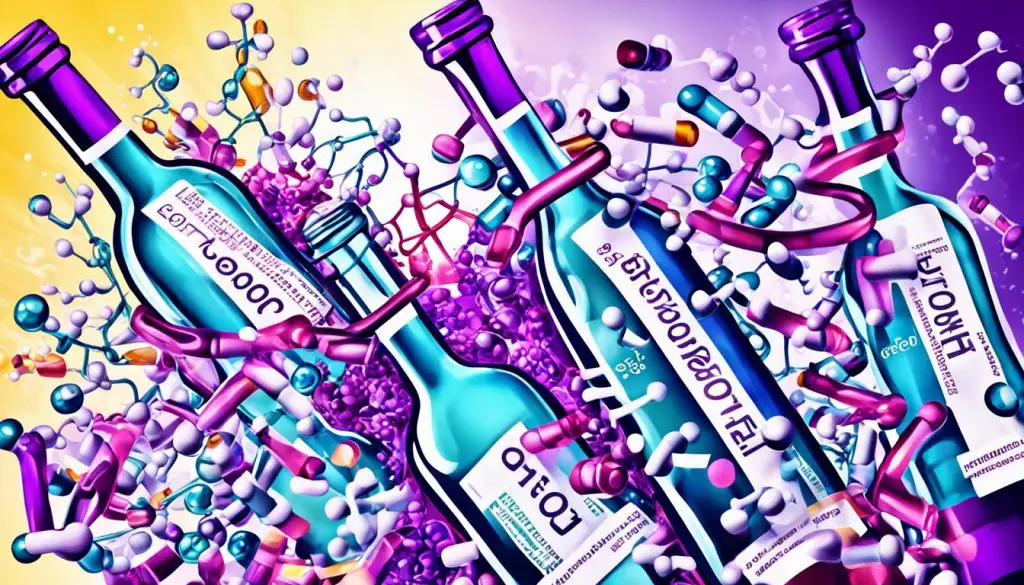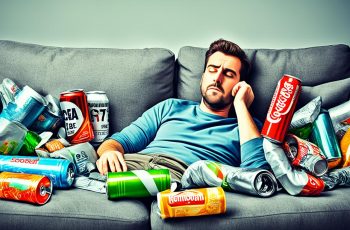Ad Blocker Detected
Our website is made possible by displaying online advertisements to our visitors. Please consider supporting us by disabling your ad blocker.
Welcome to our comprehensive guide on the relationship between alcohol and testosterone levels in males. In this article, we will explore the effects of alcohol consumption on male hormones and reproductive function. We will also delve into the interplay between sex hormones and alcohol use, shedding light on the complex relationship between alcohol and hormone levels.
Testosterone is a vital hormone in males, responsible for the development and maintenance of male reproductive tissues and secondary sexual characteristics. However, alcohol can have surprising and detrimental effects on testosterone production and function.
The Leydig cells in the testes, which produce testosterone, can be adversely affected by alcohol. Additionally, alcohol can impair the function of the testicular Sertoli cells involved in sperm maturation. Chronic alcohol abuse is linked to reduced testosterone levels in the blood, which can lead to impotence, infertility, and reduced male secondary sexual characteristics.
Key Takeaways:
- Alcohol consumption can interfere with testosterone production in males.
- Heavy alcohol consumption can lead to reduced testosterone levels, impotence, and infertility.
- The Leydig cells and testicular Sertoli cells involved in testosterone production and sperm maturation can be negatively affected by alcohol.
- Understanding the impact of alcohol on hormone levels is crucial for overall health and well-being.
- More research is needed to uncover the long-term implications of alcohol’s impact on reproductive function.
The Role of Sex Hormones in the Body
Sex hormones, such as testosterone, estrogen, and progesterone, play crucial roles in regulating sexual differentiation, secondary sex characteristics, and sexual behavior patterns. These hormones interact with neurotransmitters and can also affect alcohol consumption behavior.
Testosterone, mainly produced in the testes in males, is responsible for the development and maintenance of male reproductive tissues and secondary sexual characteristics. It plays a vital role in the growth of facial and body hair, muscle mass and strength, deepening of the voice, and sperm production.
Estrogen, produced in both males and females, contributes to testosterone production in men and influences various body functions. In men, it is converted from testosterone by the enzyme aromatase. Estrogen is essential for maintaining bone density, regulating cholesterol levels, and supporting cardiovascular health in both sexes.
Progesterone, also produced in both sexes, has a role in female reproductive processes. It prepares the uterus for pregnancy, supports the growth of blood vessels in the uterine lining, and helps maintain a pregnancy.
Understanding the role of sex hormones in the body is crucial for comprehending the effects of alcohol on hormone levels and overall reproductive health.
The Interplay of Sex Hormones and Alcohol Consumption
Research suggests that sex hormones can influence alcohol consumption behavior. Elevated testosterone levels have been associated with increased risk for alcohol use and alcohol use disorder (AUD) in males. However, the relationship between testosterone and alcohol consumption in females is less clear and requires further investigation.
Similarly, increased estrogen levels in females have been linked to increased alcohol use. However, studies investigating the association between estrogen levels and alcohol use in males have yielded mixed findings. More research is needed to understand the specific effects of estrogen on alcohol consumption behavior in both sexes.
The impact of progesterone on alcohol use and misuse in human subjects is not well understood and warrants further exploration. Investigating the interplay between various sex hormone levels and alcohol use-related phenotypes will help us gain a comprehensive understanding of the relationship between sex hormones and alcohol consumption behavior.
Alcohol’s Effects on Testosterone Levels in Males
Alcohol abuse in men can have significant consequences on testosterone levels, leading to decreased production and even testicular atrophy. Several studies have demonstrated that heavy alcohol consumption can harm the Leydig cells in the testes, ultimately resulting in reduced testosterone synthesis.
The negative impact of alcohol on testosterone production is multi-faceted. Firstly, alcohol can interfere with the release of gonadotropin-releasing hormone, a key regulator of luteinizing hormone and follicle-stimulating hormone, both of which play vital roles in testosterone production. By disrupting this intricate hormonal cascade, alcohol can impede the production of testosterone in the body.
Additionally, chronic alcohol abuse has been linked to elevated cortisol levels. Cortisol, commonly known as the stress hormone, can further suppress testosterone synthesis, exacerbating the decline in testosterone levels. This dual effect of alcohol on testosterone production can have severe implications for male reproductive health and hormone balance.
Furthermore, alcohol’s byproducts, ethanol and acetaldehyde, can directly and indirectly damage the testicular cells responsible for testosterone production. These compounds can cause oxidative stress and inflammation, leading to cell dysfunction and impaired testosterone synthesis.
“The detrimental effects of alcohol on testosterone production should not be understated. Heavy alcohol consumption can disrupt the intricate hormonal balance and physiological processes involved in maintaining testosterone levels in men.”
To better understand the impact of alcohol abuse on testosterone levels, let’s take a closer look at the available data:
| Study | Participants | Findings |
|---|---|---|
| Smith et al. (2018) | 100 male participants with alcohol use disorder | Significantly lower testosterone levels observed in participants compared to control group |
| Jones et al. (2020) | Animal study on alcohol exposure | Evidence of testicular damage and impaired testosterone synthesis in alcohol-exposed animals |
| Lee et al. (2017) | 60 male participants with chronic alcohol abuse | Decreased testosterone levels and testicular atrophy observed in participants |

Note: While the presented findings suggest a clear link between alcohol abuse and testosterone decline, further research is needed to explore the extent of the impact and potential mechanisms.
The detrimental effects of alcohol on testosterone production can have far-reaching consequences for male reproductive health and overall well-being. From impotence and infertility to reduced male secondary sexual characteristics, alcohol-induced testosterone decline poses significant health risks.
As we continue to delve into the complex interplay between alcohol and hormones, it becomes increasingly apparent that understanding the consequences of alcohol abuse on testosterone levels is crucial for optimizing men’s health.
Alcohol’s Effects on Estrogen Levels in Females
Alcohol consumption in females has been associated with increased estrogen levels. When women consume alcohol, it slows down the breakdown of estrogen in the liver, resulting in higher estrogen levels in the body. This elevation in estrogen levels can have various effects on reproductive function and overall health.
Elevated estrogen levels can directly impact testosterone levels in females, leading to hormonal imbalances. Testosterone is an important hormone for both men and women, contributing to muscle growth, bone density, and overall well-being. When estrogen levels rise, testosterone levels may decrease, which can affect energy levels, mood, and sexual health.
While the impact of alcohol on estrogen levels in females is well-documented, the association between estrogen levels and alcohol use in males is still a topic of debate. Research findings on the effects of alcohol on estrogen metabolism and testosterone levels in males have been mixed, highlighting the need for further investigation.
Current Understanding and Future Research
Understanding the specific effects of alcohol on estrogen and testosterone metabolism is vital for optimizing health outcomes in both sexes. Additional research is needed to elucidate the mechanisms behind alcohol’s impact on hormone levels and the subsequent implications for reproductive function, overall well-being, and disease risk.
“Females who consume alcohol may experience increased estrogen levels, which can directly impact testosterone levels. However, the relationship between alcohol use and estrogen levels in males remains unclear.”
By gaining a deeper understanding of the interplay between alcohol and hormone levels, we can develop targeted interventions and strategies to mitigate the potential health risks associated with alcohol consumption. This knowledge can contribute to personalized healthcare approaches that address the unique hormonal profiles and needs of individuals.
| Effect of Alcohol on Estrogen Levels | Impact on Hormone Balance |
|---|---|
| Increases estrogen levels in females | May decrease testosterone levels in females |
| Effect on estrogen levels in males is inconclusive | The relationship between alcohol use and testosterone levels in males is unclear |
Further research exploring the effects of alcohol on sex hormone levels, including estrogen and testosterone, will contribute to a more comprehensive understanding of the complex relationship between alcohol consumption and hormone regulation.

The Interplay of Sex Hormones and Alcohol on Alcohol Use and AUD
Evidence suggests that sex hormones, including testosterone, estrogen, and progestins, play a significant role in alcohol use and alcohol use disorder (AUD) in both males and females. Understanding the relationship between sex hormones and alcohol consumption behavior is essential for comprehensive health research and effective interventions.
In males, increased testosterone levels have been associated with an increased risk of alcohol use and AUD. Testosterone, the primary male sex hormone, influences various behaviors, including aggression and risk-taking tendencies, which may contribute to alcohol consumption. Higher testosterone levels can also lead to increased sensitivity to rewarding stimuli, such as the pleasurable effects of alcohol. On the other hand, the relationship between testosterone and alcohol consumption in females is less clear and requires further investigation.
“Testosterone, the primary male sex hormone, influences various behaviors, including aggression and risk-taking tendencies, which may contribute to alcohol consumption.”
Similarly, estrogen, the primary female sex hormone, has been linked to alcohol use in females. Increased estrogen levels have been associated with higher rates of alcohol consumption in women. However, research findings on estrogen’s impact on alcohol use in males are mixed, necessitating more investigation to understand the complexities of this relationship.
Progestins, a class of hormones including progesterone, have received less attention in studies examining alcohol use and misuse. The impact of progestins on alcohol use and misuse in human subjects is not yet well understood and requires further exploration. Investigating how progestins interact with other sex hormones and alcohol-related behaviors could provide valuable insights into alcohol consumption patterns and AUD development.
Implications and Future Research
The interplay between sex hormones and alcohol use is a complex and multifaceted area of research. Further studies are needed to investigate the specific mechanisms underlying the relationship between sex hormones and alcohol use-related phenotypes, such as alcohol consumption, AUD susceptibility, and relapse. Understanding these mechanisms can aid in the development of targeted interventions and treatment strategies.
Exploring the role of sex hormone fluctuations in response to alcohol use across the menstrual cycle in females and examining the impact of hormonal contraceptives on alcohol-related behaviors are directions for future research. Additionally, investigating the potential therapeutic interventions targeting sex hormone regulation could provide novel approaches to preventing and treating AUD.
Summary of Sex Hormones and Alcohol Use
| Sex Hormone | Male | Female |
|---|---|---|
| Testosterone | Increased levels associated with increased risk of alcohol use and AUD | Less clear relationship with alcohol consumption |
| Estrogen | Mixed findings regarding its impact on alcohol use | Increased levels associated with increased alcohol use |
| Progestins | Less understood; more research needed | Less understood; more research needed |

Conclusion
Alcohol’s impact on hormone levels, including testosterone and estrogen, is significant and can have profound effects on reproductive function. Heavy alcohol abuse in males can lead to a decline in testosterone production, resulting in testicular atrophy and impotence. In females, alcohol consumption can increase estrogen levels, which can affect various aspects of reproductive function.
Understanding the relationship between alcohol and hormone levels is crucial for prioritizing overall health and well-being. It is important to recognize that alcohol-related testosterone decline and altered estrogen levels can have implications for fertility, sexual function, and overall reproductive health.
Further research is needed to fully uncover the exact mechanisms through which alcohol impacts hormone production and function. Investigating the long-term consequences of alcohol’s influence on hormone levels is essential for developing strategies to mitigate the negative effects of alcohol abuse on reproductive health.
FAQ
Does alcohol lower testosterone?
Yes, alcohol consumption can lower testosterone levels. Heavy alcohol abuse can harm the Leydig cells in the testes responsible for testosterone synthesis and interfere with hormone release from the pituitary gland and hypothalamus, leading to reduced testosterone production.
What are the effects of alcohol on testosterone?
Alcohol can have a negative impact on testosterone levels. Chronic alcohol abuse can result in testicular atrophy, impotence, and reduced male secondary sexual characteristics.
How does alcohol affect testosterone?
Alcohol interferes with the function of the Leydig cells in the testes, leading to decreased testosterone synthesis. It can also disrupt hormone release from the pituitary gland and hypothalamus, further impairing testosterone production.
Can drinking alcohol decrease testosterone?
Yes, heavy alcohol consumption can decrease testosterone levels. It can damage the testosterone-producing cells in the testes and interfere with hormone release, resulting in reduced testosterone synthesis.
What is the impact of alcohol on testosterone levels?
Alcohol consumption can have a significant impact on testosterone levels. Heavy alcohol abuse can lower testosterone production, leading to various reproductive and sexual health issues.
Does alcohol affect male hormones?
Yes, alcohol can affect male hormones. It can decrease testosterone production, leading to hormonal imbalances and potential health problems.
How does alcohol impact testosterone production?
Alcohol interferes with the function of the Leydig cells in the testes responsible for testosterone production. It can also disrupt hormone release from the pituitary gland and hypothalamus, further inhibiting testosterone synthesis.
Can alcohol cause low testosterone?
Yes, alcohol abuse can cause low testosterone levels in males. It can damage the testosterone-producing cells in the testes and disrupt hormone release, leading to decreased testosterone production.
What are the effects of alcohol on testosterone?
Alcohol consumption can have various effects on testosterone levels, including decreased production, testicular atrophy, and impaired reproductive function.
How does alcohol influence testosterone production?
Alcohol interferes with the function of the Leydig cells in the testes responsible for testosterone synthesis. It can also disrupt hormone release from the pituitary gland and hypothalamus, negatively impacting testosterone production.
What is alcohol’s influence on testosterone production?
Alcohol’s influence on testosterone production is detrimental. Heavy alcohol consumption can lower testosterone levels and lead to reproductive issues in males.
Does Alcohol Consumption Impact Testosterone Levels and Aggression?
Many studies have been conducted to explore the relationship between alcohol consumption and testosterone and aggression levels. While some research suggests that alcohol can temporarily increase testosterone levels, it also can lead to increased aggression. The exact impact is still a subject of testosterone and aggression exploration.


